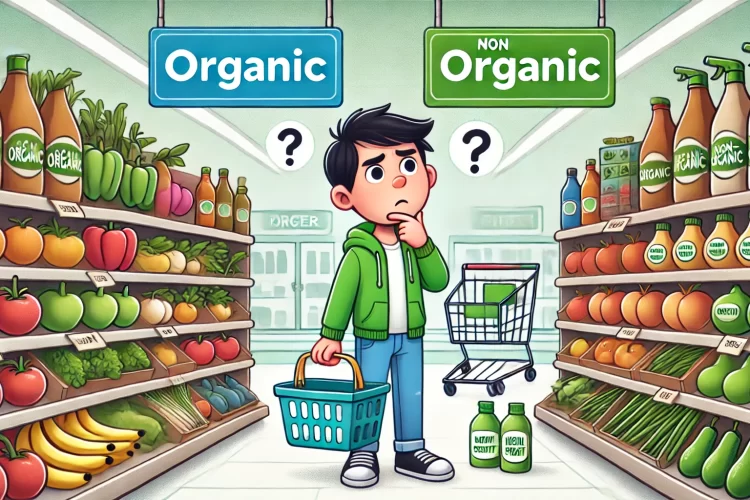Health Benefits of Organic Foods
1. Fewer Pesticides and Harmful Chemicals
Organic farming avoids synthetic pesticides and fertilizers, which are commonly used in conventional agriculture. This means organic fruits and vegetables typically have lower pesticide residues, reducing your exposure to harmful chemicals. For families, especially those with young children, this can be a significant benefit as it lowers the risk of pesticide-related health problems. Exposure to high levels of pesticides has been linked to developmental problems, hormone disruption, and even cancer, making the switch to organic foods an important health precaution.
2. Richer in Nutrients
Several studies suggest that organic foods may contain higher levels of essential nutrients like vitamins, minerals, and antioxidants. These compounds play a critical role in fighting inflammation, boosting immunity, and protecting against chronic diseases. For example, research has shown that organic fruits and vegetables often contain higher levels of vitamin C, iron, magnesium, and phosphorus. Additionally, organic foods are richer in antioxidants, which help neutralize harmful free radicals in the body and reduce the risk of diseases such as cancer and cardiovascular conditions.
3. Better Taste and Quality
Many people report that organic foods taste better. This could be due to the farming methods that prioritize soil health and plant diversity. Organic farming focuses on quality over quantity, which may result in richer flavours and fresher produce. Organic farmers also allow crops to mature naturally, which enhances their taste and nutrient profile. Consumers often find organic fruits and vegetables juicier, sweeter, and more flavourful than their conventionally grown counterparts.
4. No GMOs or Artificial Additives
Organic foods are free from genetically modified organisms (GMOs) and artificial additives, such as preservatives, colourings, and flavour enhancers. This ensures that what you’re eating is closer to its natural state, without the hidden chemicals that can sometimes cause adverse reactions. Many additives used in conventional foods have been linked to allergies, digestive issues, and behavioural problems, making organic options a safer choice.
5. Reduced Risk of Antibiotic Resistance
The overuse of antibiotics in conventional farming has contributed to the rise of antibiotic-resistant bacteria. Organic farming avoids antibiotics, helping to combat this growing health concern and ensuring safer food options. Organic livestock are raised without the routine use of antibiotics, reducing the likelihood of resistant strains developing and spreading.
6. Hormone-Free and Safer Dairy and Meat Products
In conventional animal farming, hormones are often used to promote growth and increase milk production. These hormones can make their way into the human body through consumption, potentially disrupting hormonal balance and increasing the risk of certain cancers. Organic meat and dairy products, however, are free from growth hormones, offering a healthier alternative.
Environmental Benefits of Organic Farming
1. Enhanced Soil Health
Organic farming practices emphasize the use of natural fertilizers, crop rotations, and composting, which improve soil fertility and structure. By avoiding synthetic fertilizers and pesticides, organic farming maintains soil biodiversity and reduces soil erosion, leading to more sustainable agricultural systems. Healthy soils are essential for long-term agricultural productivity and play a vital role in carbon sequestration, helping to mitigate climate change.
2. Reduced Water Pollution
Conventional farming’s reliance on chemical inputs can lead to the contamination of water sources through runoff, adversely affecting aquatic ecosystems and potentially entering human drinking water supplies. Organic farming minimizes this risk by eliminating synthetic chemicals, thereby protecting water quality and contributing to healthier ecosystems.
3. Biodiversity Conservation
Organic farms often support greater biodiversity than conventional farms. By avoiding chemical pesticides and fostering diverse crop rotations, organic farming creates habitats for various plant and animal species. This biodiversity is crucial for ecosystem resilience, pollination, and natural pest control, contributing to the overall health of the environment.
4. Lower Greenhouse Gas Emissions
Some studies have indicated that organic farming can result in lower greenhouse gas emissions per unit of land compared to conventional farming. This reduction is attributed to the absence of synthetic nitrogen fertilizers, which are significant sources of nitrous oxide, a potent greenhouse gas. Additionally, organic farming practices that enhance soil health can increase carbon sequestration, further mitigating climate change.
5. Sustainable Water Usage
Organic farming methods prioritize water conservation through practices like mulching, cover cropping, and reduced tillage. These techniques improve soil structure and water retention, reducing the need for irrigation and minimizing water waste. In regions prone to drought, sustainable water use is a vital benefit of organic agriculture.
Animal Welfare and Ethical Farming Practices
1. Humane Treatment of Livestock
Organic farming standards require that animals are raised in conditions that allow for natural behaviors, including access to the outdoors, sufficient space, and appropriate shelter. This focus on animal welfare ensures that livestock are treated humanely, reducing stress and improving their overall quality of life.
2. Absence of Confinement and Overcrowding
Unlike some conventional farming operations that confine animals in tight spaces, organic farming prohibits such practices. Livestock on organic farms are provided with ample space to move freely, promoting better health and reducing the incidence of disease.
3. Natural Diets
Organic livestock are fed organic diets free from animal by-products, GMOs, and synthetic additives. Providing animals with natural, species-appropriate diets contributes to their health and well-being, resulting in higher-quality meat, dairy, and egg products for consumers.
Economic and Social Benefits
1. Supports Local Farmers
Many organic products are sourced from local farms, supporting small farmers and reducing the carbon footprint associated with transportation. Buying local organic produce strengthens community economies and promotes fresher, seasonal eating.
2. Promotes Fair Trade Practices
Organic certification often overlaps with fair trade standards, ensuring that farmers and workers are paid fair wages and work in safe conditions. Supporting organic agriculture helps create equitable supply chains and sustainable livelihoods.
3. Long-Term Health Savings
While organic foods may sometimes come with a higher price tag, investing in your health today can save you from potential medical bills in the future. The cleaner, nutrient-dense nature of organic food can help lower the risk of diseases and contribute to long-term well-being.
Final Thoughts
Eating organic foods offers a wide range of benefits—from better health and superior taste to environmental sustainability and ethical farming practices. Whether you’re looking to reduce your chemical exposure, support local farmers, or simply enjoy fresher and tastier food, going organic is a step toward a healthier and more sustainable lifestyle. Next time you’re at the grocery store, consider reaching for organic options—you might just notice the difference!


